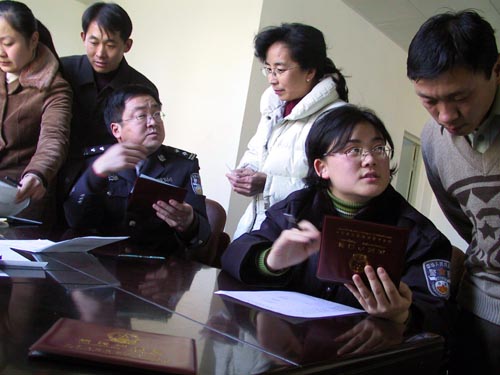Hot on the Web
Speed up reform of household registration, say newspapers
By Xie Yu (China Daily)
Updated: 2010-03-02 07:55
 |
Large Medium Small |
|
 |
|
Migrants moving into Shizhong district of Jinan, Shandong province, go through registration formalities with their residence booklets in a local police office.[Jiang Hao/China Daily] |
BEIJING: More than a dozen metropolitan newspapers covering 11 provinces in China have made a rare joint appeal for accelerating the reform of the country's household registration, or hukou, system in a co-signed editorial.
The editorial, published on Monday in 12 newspapers, said the household registration regulations issued in 1958 should be abolished as soon as possible.
| ||||
"Bad policies unsuitable to these times enrage the people," said an editorial in the Metropolis Times of Kunming, one of the regional papers that carried similar editorials on Monday.
The move came as the National People's Congress (NPC), China's top legislature, and the national committee of the Chinese People's Political Consultative Conference (CPPCC), the country's top political advisory body, will hold their annual sessions this week.
The NPC deputies and CPPCC National Committee members should "press related ministries and departments to provide a clear timetable for a national household registration reform, and gradually use personal information registration to replace household registration and then finally eliminate it", the editorials said.
Zhang Hong, a commentator from the Beijing-based Economic Observer and also the initiator of the move, said the campaign is "a rare collective movement of the Chinese media".
It shows the domestic media's strong desire to take part in the national reform, he said.
An editor surnamed Shan in the commentary department of the Chongqing Times said the paper joined the movement because the household registration system "has shackled the rights of people".
On Sunday, Premier Wen Jiabao said during a webcast with netizens that China would advance the reform of its household registration system to solve problems for new-generation migrant workers.
Set up in 1958 as part of the communization drive, the household registration system has restrained migration by linking access to public services such as health care and education, among other rights, to the place where a person's hukou is registered.
Under the current system, permanent residences registered by migrant workers remain in the countryside, making it hard for them to obtain welfare in urban work places.
Wang Yukai, professor from the Chinese Academy of Governance, said the system is the "last fort" remaining after 30 years of reform in China, and clearly lags behind the transformation of other fields, he said.
Beginning last year, central authorities pledged to "push for urbanization in an active and steady manner" and to "solve the hukou problem among migrant workers".
Pilot programs have been carried out in more than 10 cities, including Shanghai, Shenzhen, and Guangzhou, where governments began to grant permanent residency and access to social welfare to non-locals working and living in the cities.
"We are glad to see these changes. However, we see more people in more places still trapped by this system. Reform of this system would not only benefit people's livelihoods, but would also inject more vitality into the Chinese economy. More importantly, it would set up the people-oriented awareness, which would push society progress and harmony," said the editorials.








